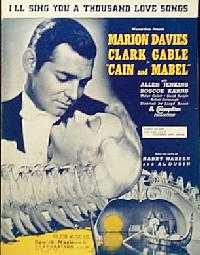Cain and Mabel
| Cain and Mabel | |
|---|---|
 sheet music for "I'll Sing You a Thousand Love Songs" | |
| Directed by | Lloyd Bacon |
| Produced by |
Hal B. Wallis Jack L. Warner |
| Written by | H.C. Witwer (story) |
| Screenplay by | Laird Doyle |
| Starring |
Marion Davies Clark Gable Allen Jenkins |
| Music by |
Songs: Harry Warren (music) Al Dubin (lyrics) Score: Bernhard Kaun Heinz Roemheld (both uncredited)[1] |
| Cinematography | George Barnes |
| Editing by | William Holmes |
| Studio | Warner Brothers |
| Release dates | September 26, 1936 |
| Running time | 90 minutes |
| Country | United States |
| Language | English |
Cain and Mabel is a 1936 romantic comedy film designed as a vehicle for Marion Davies in which she co-stars with Clark Gable. The story had been filmed before, in 1924, by William Randolph Hearst's production company, Cosmopolitan, as a silent called The Great White Way, starring Anita Stewart and Oscar Shaw. In this version, Paige introduced the song "I'll Sing You a Thousand Love Songs", with music by Harry Warren and words by Al Dubin, who also wrote "Coney Island", "Here Comes Chiquita" and other songs.
Plot
Waitress-turned-Broadway star Mabel O'Dare (Marion Davies) and garage-mechanic-turned-prize fighter Larry Cain (Clark Gable) dislike each other intensely, but press agent Aloysius K. Reilly (Roscoe Karns) cooks up a phony romance between them for publicity. Inevitably, the two fall in love for real, and plan on getting married, with Mabel quitting show business to be a housewife and Cain quitting the fight racket to run garages in New Jersey.
When their entourages get wind of their plan, they plant the story in the newspapers, and each thinks the other one betrayed their secret - until Mabel's aunt (Ruth Donnelly) tells Mabel the truth. Mabel abandons her show and rushes to Philadelphia were Cain is fighting. Having been told by his manager that Mabel is going to marry crooner Ronny Caudwell (Robert Paige), an enraged Cain is waging an all-out fight against his opponent, until he hears Mabel's voice and is knocked down. Reilly confesses to Cain that he was the one who leaked the story, and Cain's second, DoDo (Allen Jenkins) accidentally throws a towel into the ring, making Cain the loser by a technical knockout. But since Mabel has bet on the other boxer, the newly reunited couple will have a tidy nest egg to start their new life together.
Cast
- Marion Davies as Mabel O'Dare
- Clark Gable as Larry Cain
- Allen Jenkins as Dodo
- Roscoe Karns as Aloysius K. Reilly
- Walter Catlett as Jake Sherman
- Robert Paige as Ronny Cauldwell (billed as David Carlyle)
- Hobart Cavanaugh as Milo, the Stage Manager
- Ruth Donnelly as Aunt Mimi
- Pert Kelton as Toddy Williams
- William Collier, Sr. as Pat "Pop" Walters
- Sammy White as singer in "Coney Island"
- E.E. Clive as Charles "Chuck" Fendwick
- Allen Pomeroy as Fighter Tom Reed
- Robert Middlemass as Mr. George, Cafe Proprietor
- Joseph Crehan as Reed's Manager
Production and reception
Shooting on Cain and Mabel was delayed because the part of the leading man, which eventually went to Clark Gable, had not yet been cast.[2] Publisher William Randolph Hearst, Marion Davies' lover, convinced Warner Bros. studio head Jack Warner, an old friend, to get Gable from MGM as Davies' co-star.[1] Hearst wielded considerably influence on the production: he also rejected Dick Powell for the part which went to Robert Paige – billed here as "David Carlyle" – apparently because he was jealous that Davies found Powell attractive.[1]
The film was a box-office office flop, with critics finding that Gable was miscast as a fighter.[1]
Awards and honors
Cain and Mabel was nominated for a 1937 Academy Award for "Best Dance Direction" by Bobby Connolly.[3][4][5]
References
- Notes
- ↑ 1.0 1.1 1.2 1.3 McGee, Scott. "Cain and Mabel" (article) on TCM.com
- ↑ "Notes" on TCM.com
- ↑ "Awards" on TCM.com
- ↑ Bobby Connolly at the Internet Movie Database
- ↑ "Awards" on AllRovi
External links
- Cain and Mabel at the Internet Movie Database
- Cain and Mabel at the TCM Movie Database
- Cain and Mabel at allmovie